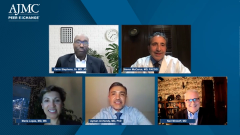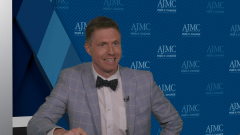
Transformative Opportunities in Women’s Health
Panelists share their final insights on improving the trajectory for women’s health care.
Episodes in this series

Neil Minkoff, MD: Let me shift gears a little here as we wind down because I’m trying to be aware of the clock and make sure we’re respectful of everybody’s time. One of the things that comes up frequently as we discuss some of these issues, especially at a societal level—maybe more so than as a payer issue or provider issue—is overall access for women to appropriate reproductive health and the availability of different therapies. Not every woman is getting into a clinic with folks like you guys who are going to sit down and do shared decision-making with them about the long-term complications of therapy and so on.
I wonder if I could get the different folks on this panel to discuss a little about what they see in terms of these disparities and some of the things that we can do about them societally as providers and payers. I realize it’s a big topic, but it seems to be relevant. Because a pet peeve of mine that we get tied up in is when the clinician says this, the payer says that, and the independent reviewer says this. There’s this whole population that doesn’t even get to that point. What are some of the things that we should be doing to try to deal with the fact that we have an aging population that’s probably going to be dealing with more of these issues and may not have appropriate access?
Kevin Stephens, Sr. MD, JD: The key in most relationships is communication, and the breakdown in communication leads to a plethora of problems. Part of it is that we all need to communicate better together. It’s good if we can get 1 message. That would also be helpful. The patient gets confused when [there are mixed messages]. Then they read the newspaper, watch TV, and see an advertisement or something and get another message. We all need to learn, and that’s what’s great about what we’re doing in this program. We’re communicating, talking, dialoguing, and expressing different approaches and ideas. That’s what we have to do. Sometimes we have to throw mud against the wall and see what sticks. Then we can go from there.
The first step in this process would be to increase the communication. It’s great that Steven and Ayman said that when they had the peer-to-peer process they got a positive outcome out of it and that after speaking with a reviewing physician, they were able to come to a meeting of the minds. As you mentioned, all of us have to broaden the conversation. The conversation can’t just be between the payer and provider or the payer and the patient. It needs to be all of us together. Maybe we [should] do forums where we can have more of an open mic, so to speak, so that everyone can bring issues to the table. We can have dialogue, and maybe we can start to defuse this. Because we’re in an information era. You can jump on the internet, turn on TV. There’s information all over the place.
Part of it is that some people aren’t as well equipped. Dr Lopes mentioned health literacy. That’s a big problem. Not everyone is at the same level of literacy. We have to accommodate for that. We mentioned providers. You have great people who are great surgeons, like Steven. Then you have other people who aren’t so adept at robotics and all these new technologies. It’s a tough world we live in. If I had to pick 1 thing, we need to work on communication first. Then we could look at policy and algorithms. But it starts with communicating.
Neil Minkoff, MD: With that, I’m going to say that we’re getting near the end here. I’d like to take a moment and thank everybody who was involved in our panel. We had a very rich and informative discussion. Hopefully this went along with everybody’s experience in peer-to-peer where we had a good set of peer-to-peer discussions and were able to come away with some overlapping interests rather than a conflict, which is always nice. I’d like to get 1 or 2 closing thoughts from each of you. I’ll ask Dr Lopes if she’d be kind enough to go first.
Maria Lopes, MD, MS: Sure. Thank you, Neil. I really appreciated the forum. It’s about education and awareness. Not just provider education, but patient education. We aren’t that far apart as payers and providers in terms of thinking about patients and how it’s impacting the system. It’s also about best practices. I enjoyed the dialogue around what’s being seen from the clinician side as well as what payers see and how we can hopefully look at the data and evidence and define what best practices can look like not only in terms of the diagnostic algorithm but the practice side as well.
Neil Minkoff, MD: Ayman?
Ayman Al-Hendy, MD, PhD: I thank you for the opportunity. I love this discussion. I learned a lot from Kevin and Maria, and I always learn from Steve when I listen to him. I agree with everything that was said. I want to also mention community education. There’s still a lot of stigma out there. There’s still a lot of stigma with anything to do with menstruation or the vagina. At some forums, you can’t say these words out loud. [We need] a lot of community education. Unfortunately, many patients with these conditions suffer in silence. They’ve been normalizing their symptoms and told this is just part of being a woman—that you just have to put up with it. A lot of education in the community would be a great help. Thank you for this opportunity.
Neil Minkoff, MD: Excellent. Dr Stephens?
Kevin Stephens, Sr. MD, JD: Thank you, Neil. Hats off to the sponsors. This is a great forum. We need to do many more of these. Perhaps we can figure out a way to even get patients participating in some of these things. That may be another way to incorporate them. But with that being said, my main point is that we’re in the infancy of a tremendous technological boom. With medications, DNA, RNA, we’re at the tip of the iceberg. With the COVID-19 vaccine and so forth, there are so many things. Over the next few years, we’re going to have an explosive number of pharmaceutical interventions available for us. That’s number 1.
The level of imaging we can do between transvaginal ultrasounds, MRIs, CTs, and so forth is also booming. As Steven said, there are all kinds of surgical interventions that we can do for many procedures. That’s the beginning of where we’re going. The key is communicating, collaborating, and working together to compromise. It’s not my way or your way, it’s our way. Let’s figure out how we can walk together down these paths. Because if not, we’re going to have big problems. We all need to learn how to work together for the benefit. That’s how we get a better health care delivery system. Thank you so much.
Neil Minkoff, MD: Last but not least, Steve, if you wouldn’t mind taking us home.
Steven McCarus, MD, FACOG: This was a real pleasure. Dr Minkoff, thank you so much for inviting me, and the AJMC. I hadn’t been involved with this forum before, and I enjoyed every minute of it. You did a great job moderating. It’s not easy to do that. You kept us all engaged. I thank you for that. And of course, meeting new people. You all were great as a faculty. Ayman, it’s great to see you.
My whole career, I’ve been working to try to optimize women’s reproductive health. For 35 years, I’ve been taking care of women. I hope the payers, clinicians, and patients will continue to work together. The 1 thing I’ve learned in 35 years is that when a woman makes her mind up, nobody can change it. It’s our job to educate her, give her access to the information and great care, and make sure we can pay for it in any way we can. That’s all our job. Thank you very much for a great evening, I thoroughly enjoyed the discussion. You all are great. Thank you so much.
Neil Minkoff, MD: Allow me to say thank you once again to all of our panelists for a very robust discussion that everybody got a lot out of. I hope everybody who has come into our viewing audience has found this to be as robust and informational as our participants have found it. I’d like to thank the American Journal of Managed Care for this Peer Exchange. We hope that you’ll find it useful and enjoy watching it. Thank you very much.
Transcripts edited for clarity.
Newsletter
Stay ahead of policy, cost, and value—subscribe to AJMC for expert insights at the intersection of clinical care and health economics.










